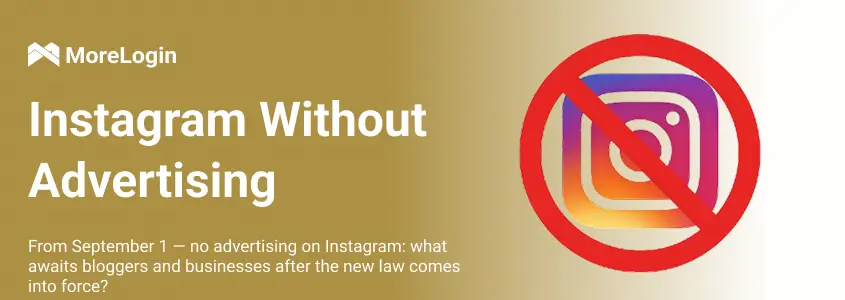
- Product

- Pricing
- Affiliate Program
- Use Cases
- Resource


Starting September 1, 2025, a new law comes into force in Russia that bans advertising on Instagram. This isn’t just another complication with Meta—it’s an officially codified ban that will affect everyone: bloggers, affiliate marketers, brands, and agencies.
The new rule applies to anyone who earns money or promotes a business through Instagram, even if it’s just native posts or seemingly harmless Stories. Let’s break it down: what exactly counts as advertising, what is allowed, what isn’t, how to promote yourself or your business now, and what consequences await for violations.
Important: Instagram itself is not banned. You can still post photos, Stories, and texts—the law doesn’t affect that. Problems start when advertising is involved.
Advertising is defined as any information aimed at promoting a product, service, or brand for which you receive compensation. It doesn’t matter whether you explicitly say “buy this” or just include a link without words—if payment is involved, it’s considered advertising.
Examples that fall under the ban:
Links to online stores, even without direct calls to action.
Brand mentions you were paid for or received as barter.
Any form of covert advertising if payment can be proven.
No geotags, proxies, foreign brands, or virtual cards will save you: if you're located in Russia or targeting a Russian audience, the law applies to you.
Affiliate marketing (traffic arbitrage) on Instagram becomes officially illegal from September 1, 2025. Regardless of whether your offer targets the US, Europe, or anywhere else—even if you use "gray" accounts and foreign bank cards—the act of placing advertising on Instagram is a violation if you are physically in Russia or working with a Russian audience.
The consequences are serious. First and foremost, there are administrative fines:
Up to 500,000 RUB for individuals
Up to 4 million RUB for legal entities
In addition to fines, you may be subject to inspections by Roskomnadzor and tax authorities. The risk is especially high for those who work openly or leave a digital footprint. In some cases, the state may use such violations as public examples to show the inevitability of punishment and to tighten digital control.
Everyone in the advertising chain is subject to the new law—no exceptions.
Bloggers can be fined for any ad post or Story, regardless of its format.
Advertisers who order promotions from bloggers on Instagram automatically become accomplices, even if they don’t post ads themselves.
Agencies and affiliate networks that pass along orders or offer placement guidance are also liable.
Being registered as self-employed or as an individual entrepreneur does not protect you. The key factor is whether there was compensation for the post—not how the deal was formalized.
Using anonymity tools like MoreLogin or anti-detect browsers, which hide digital traces and manage multiple accounts, offers no legal protection. If ad placement is proven, no technical tricks, proxies, or location masking will shield you from liability.
Furthermore, bloggers physically outside Russia but working with a Russian audience may also be at risk. If they have assets in Russia or occasionally cross the border, they too may theoretically be held accountable.
Not all is lost. There are ways to keep blogging without breaking the law:
Native content without links or calls to action. Just share about yourself and your experiences. Don’t mention brands or include links—that’s not advertising.
Move your activity to other social networks. Telegram, VK, and Yandex.Zen are still “clean” platforms. Use Instagram as a visual portfolio without direct sales.
Build your personal brand. Don’t promote specific products—promote yourself as an expert, personality, or community.
Businesses urgently need to adapt to this new reality. Continuing advertising activities on Instagram is no longer an option, so it’s crucial to look for alternative channels.
Advertising is still allowed on Telegram, VK, marketplaces, and search engines. Focus your efforts there.
At the same time, it’s important to build your own databases—email lists, phone numbers, chatbots. These are your direct communication channels that can’t be blocked or restricted externally.
SEO and organic traffic now play a vital role: content, search rankings, blogs—these offer a longer but more stable path to staying visible without risking fines.
You can still work with influencers, but on other platforms. VK, Telegram, and YouTube influencers can still legally collaborate with brands—this is where you should find new partners for promotion.
Start reallocating ad budgets now. This law is not just about Meta—it targets all advertising that escapes Russian regulatory oversight. Those who adapt quickly will retain their clients and market position. The rest risk financial losses, blocks, and legal troubles.
The conclusion is simple: Instagram as an advertising tool in Russia is dead. Personal blogs and visual content without sales are all that’s left. Everything related to promotion must move to other channels—or face hefty fines.
Quick adaptation = survival.
Those who act fast will gain new clients on “free” platforms. Those who don’t—will pay the price.